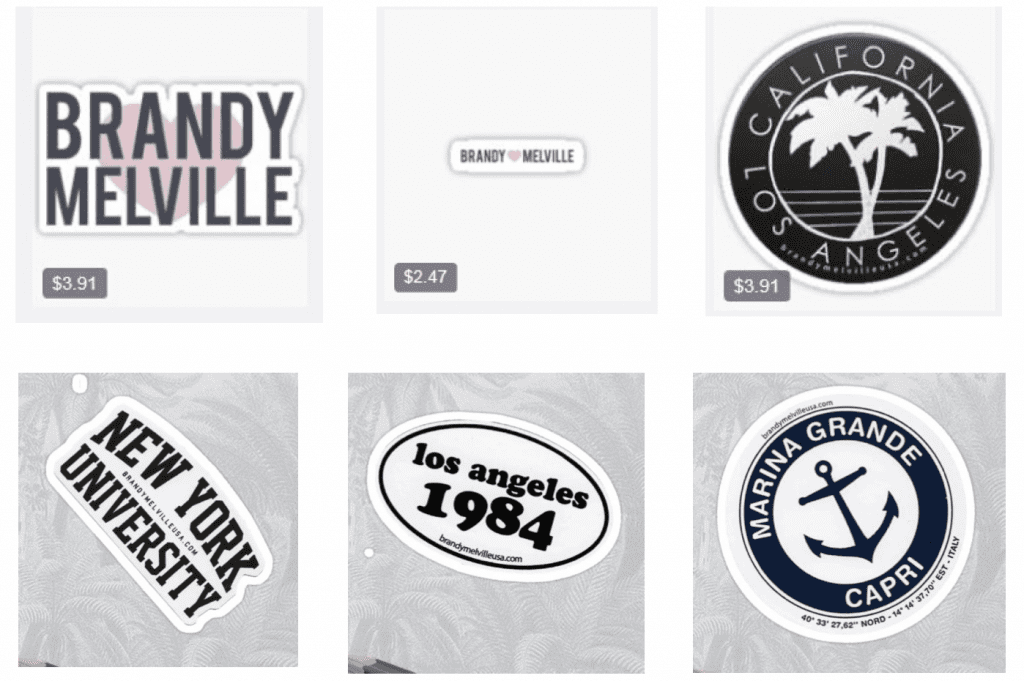Redbubble is liable for the trademark infringing third-party products that are offered up to consumers by way of its marketplace website, a jury in California determined last month when it awarded $520,000 in damages to plaintiff Brandy Melville. In a verdict dated June 23, which came out of the U.S. District Court for the Central District of California, a jury found that print-on-demand e-commerce marketplace Redbubble should pay Brandy Melville $300,000 for its infringement the Brandy Melville trademark that features the brand’s name positioned around a pale pink heart, $200,000 for infringing Brandy Melville’s “Los Angeles Lightning” mark, and $20,000 for its infringement of the other marks held by the millennial-favored fashion brand.
The damages award comes over two years after Brandy Melville filed suit against Redbubble, arguing that the online marketplace for print-on-demand products has offered up and sold third-party designed “products that utilize Brandy Melville trademarks directly.” In the complaint that it filed in May 2019, Brandy Melville claimed that while “Redbubble describes itself on its website as a ‘global online marketplace powered by artists,’ what [the company] does not mention is that it is also a global online marketplace powered by a substantial quantity of counterfeit goods.” And as Brandy Melville argued, at least some of those counterfeit goods bear its own branding, which could cause consumers to be confused as to the source or nature of the products.
“Despite being placed on notice of Brandy Melville’s intellectual property rights, including its registered trademarks” for its name and logo, as well as its “LA Lightning” graphic, Los Angeles-based Melville claims that Redbubble continued “offering for sale, advertising, and selling counterfeit Brandy Melville products – including some of the same exact designs that Brandy Melville asked to be taken down in May 2018,” ultimately prompting the brand to wage direct and contributory trademark infringement and counterfeiting claims against Melbourne-based Redbubble.
Redbubble landed an early win in July 2020 when the court granted part of its motion for summary judgment, dismissing Brandy Melville’s direct trademark infringement claim and its claim that Redbubble was on the hook for trademark infringement on the basis of vicarious liability. Redbubble had previously argued that it could not be held liable for direct infringement because “it is a marketplace for third-party sellers, [and] it does not itself sell any infringing goods, and therefore, does not ‘use’ Brandy Melville’s marks in commerce.” And the court agreed.

It was not a complete win for Redbubble, though, as the court let Brandy Melville’s contributory liability claims go forward, with Judge R. Gary Klausner of the U.S. District Court for the Central District of California stating that there is “a well-developed legal doctrine for imposing liability on the proprietor of a marketplace for infringement by a third-party seller, [and] that doctrine is contributory trademark infringement.”
While Redbubble argued that it is “insulated from liability because it promptly removed any infringing listing about which Brandy Melville complained, and has a system in place to prevent similar infringement in the future,” the court determined that there was sufficient evidence to give rise to material dispute of fact about Redbubble’s knowledge of infringing activity its platform, and thus, its potential “willful blindness,” which could give rise to contributory liability. (The court noted that neither the flea market situation at issue in the 2010 case that Coach filed against Goodfellow nor eBay’s online resale site, which was at the heart of a famous case filed by Tiffany & Co. – two cases that Redbubble cited in its motion for summary judgment – “is a perfect analogy for Redbubble’s business model.”)
Fast forward to June 2021 and on the heels of trial, a jury sided with Brandy Melville on the basis of Redbubble’s willful contributory liability infringement, which Frankfurt Kurnit Klein & Selz PC attorney Kimberly M. Maynard says “occurs when the defendant ‘intentionally induces’ the infringer to commit trademark infringement or continues to supply products to persons it knows are engaging in trademark infringement.” In the case at hand, she notes that Brandy Melville alleged – and the jury agreed – that its 2018 cease and desist letter put Redbubble on notice that its trademarks were being counterfeited and that by “maintaining the listings [on its marketplace] and continuing to manufacture, ship, and profit from sales of counterfeit goods, it committed contributory trademark counterfeiting.”
Maynard asserts that the decision “likely has implications for other cases against Redbubble, including several in the California district courts and one pending in the Sixth Circuit, where that court noted that Redbubble ‘brings trademark-offending products into being,’ making it ‘more than just a passive facilitator’ and more vulnerable to claims that it contributes to any infringement occurring on its platform.”
The marketplace site has no plans to give up the fight yet. In a Litigation Update on June 24, the company stated that the outcome “is but one step in the overall litigation and number of possible steps remain before the claim is finally concluded.” It further stated that it “believes that certain critical findings were not supported by the evidence offered at trial and will be asking the court for relief from the verdict on that basis,” noting that it “remains confident in its position and will continue to vigorously pursue its defense of the claims.”
The case is Y.Y.G.M. SA d.b.a. Brandy Melville v. Redbubble, Inc., 2:19-cv-04618 (C.D.Cal).














